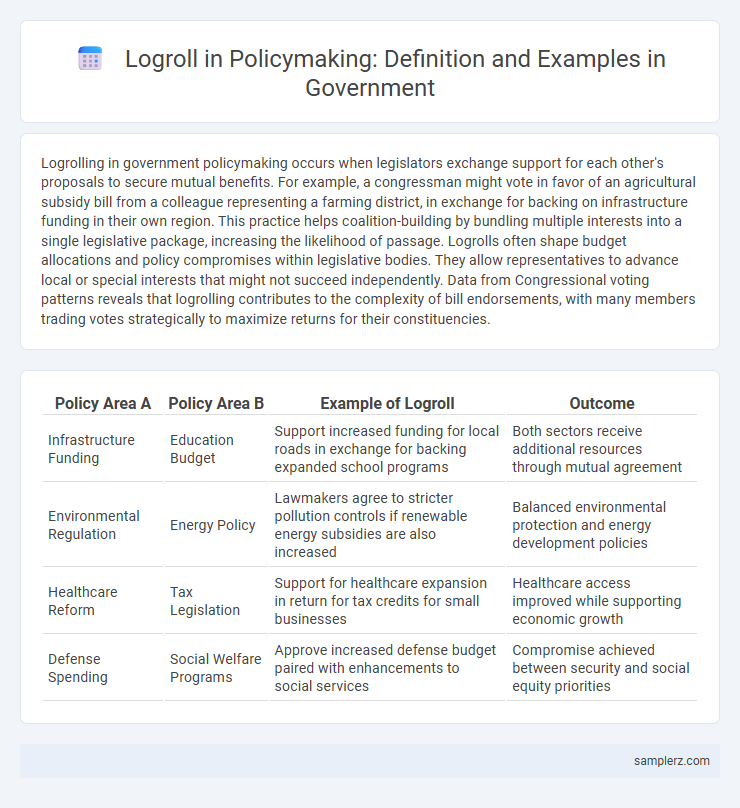Logrolling in government policymaking occurs when legislators exchange support for each other's proposals to secure mutual benefits. For example, a congressman might vote in favor of an agricultural subsidy bill from a colleague representing a farming district, in exchange for backing on infrastructure funding in their own region. This practice helps coalition-building by bundling multiple interests into a single legislative package, increasing the likelihood of passage. Logrolls often shape budget allocations and policy compromises within legislative bodies. They allow representatives to advance local or special interests that might not succeed independently. Data from Congressional voting patterns reveals that logrolling contributes to the complexity of bill endorsements, with many members trading votes strategically to maximize returns for their constituencies.
Table of Comparison
| Policy Area A | Policy Area B | Example of Logroll | Outcome |
|---|---|---|---|
| Infrastructure Funding | Education Budget | Support increased funding for local roads in exchange for backing expanded school programs | Both sectors receive additional resources through mutual agreement |
| Environmental Regulation | Energy Policy | Lawmakers agree to stricter pollution controls if renewable energy subsidies are also increased | Balanced environmental protection and energy development policies |
| Healthcare Reform | Tax Legislation | Support for healthcare expansion in return for tax credits for small businesses | Healthcare access improved while supporting economic growth |
| Defense Spending | Social Welfare Programs | Approve increased defense budget paired with enhancements to social services | Compromise achieved between security and social equity priorities |
Definition and Overview of Logrolling in Government
Logrolling in government refers to the practice where legislators exchange support for each other's proposals or bills to secure mutual approval, often resulting in the passage of measures that might not succeed independently. This strategic vote trading helps build coalitions and facilitates the advancement of diverse policy initiatives within legislative bodies. Logrolling can significantly influence policymaking dynamics by promoting negotiation, compromise, and coalition-building among elected officials.
Historical Examples of Logroll in Policymaking
In American political history, the 1820 Missouri Compromise exemplifies a logroll where pro-slavery and anti-slavery factions traded support to maintain a balance of power in Congress. The 1917 Jones Act serves as another example, with legislators exchanging votes to pass maritime laws benefiting various states' shipbuilding industries. These historical instances highlight how logrolling enables the passage of significant and often contentious policies through strategic vote trading among lawmakers.
Logrolling in Congressional Budget Negotiations
Logrolling in congressional budget negotiations involves lawmakers exchanging support for each other's budget amendments to secure mutual approvals. This practice enables the passage of complex appropriations bills by building coalitions across diverse interests and districts. Critics argue it can lead to increased spending and earmarks that might not align with overall fiscal priorities.
Case Study: Logrolling in Infrastructure Legislation
Logrolling in infrastructure legislation is exemplified by the passage of the 2021 Infrastructure Investment and Jobs Act, where lawmakers exchanged support for region-specific projects to secure broad bipartisan approval. Senators from different states agreed to fund highways, bridges, and public transit systems that directly benefited their constituencies, balancing national infrastructure priorities with local economic interests. This strategic legislative bargaining facilitated the enactment of one of the largest U.S. infrastructure bills in decades.
Logroll Deals in Social Policy Reform
Logroll deals frequently occur in social policy reform, where legislators exchange support for diverse social programs to secure broad coalition approval. For example, a lawmaker may back affordable housing initiatives in return for another's vote on expanded healthcare benefits, balancing competing priorities. This strategic bargaining enables the passage of comprehensive social reforms by aligning disparate interests and maximizing legislative consensus.
Environmental Policy and Logrolling Compromises
Logrolling in environmental policymaking often occurs when legislators trade support for different environmental policies to secure multi-faceted legislative success, such as backing a bill on renewable energy subsidies in exchange for votes on water pollution control measures. This strategic compromise allows for incorporating diverse environmental priorities, balancing economic and ecological interests while ensuring broader legislative approval. These negotiated agreements enable passing comprehensive environmental reforms that might otherwise face significant opposition.
Logrolling in Agricultural Subsidy Agreements
Logrolling in agricultural subsidy agreements often involves legislators exchanging support to secure funding for specific crops or regions that benefit their constituencies. This practice enables the passage of comprehensive agricultural bills by bundling diverse interests, such as subsidies for corn, dairy, and cotton producers. As a result, policymakers can build coalitions that balance competing demands while advancing broader agricultural policy goals.
The Role of Logroll in Coalition Governments
Logroll in coalition governments enables diverse parties to exchange policy support, ensuring the passage of legislation that benefits multiple interests. This strategic bargaining fosters compromise, allowing smaller parties to influence major policy outcomes despite limited individual power. The practice enhances legislative efficiency by aligning varied agendas, stabilizing governance through negotiated consensus.
Ethical Considerations of Logrolling in Policy Decisions
Logrolling in policymaking often involves legislators exchanging votes to secure mutual support, raising ethical concerns about prioritizing political gain over public interest. This practice can lead to the passage of policies that benefit specific groups or regions disproportionately, potentially undermining equitable resource allocation. Ensuring transparency and accountability is essential to mitigate ethical risks associated with logrolling and maintain public trust in governmental decisions.
Impact of Logrolling on Legislative Outcomes
Logrolling in government policymaking involves legislators exchanging support for each other's proposals, significantly influencing legislative outcomes by enabling the passage of bills that might otherwise stall. This practice can lead to the approval of comprehensive legislation that addresses diverse interests but often results in the inclusion of unrelated amendments, affecting policy coherence. The impact of logrolling is evident in large budget bills and infrastructure packages, where mutual back-scratching among lawmakers facilitates complex negotiations and final approval.

example of logroll in policymaking Infographic
 samplerz.com
samplerz.com